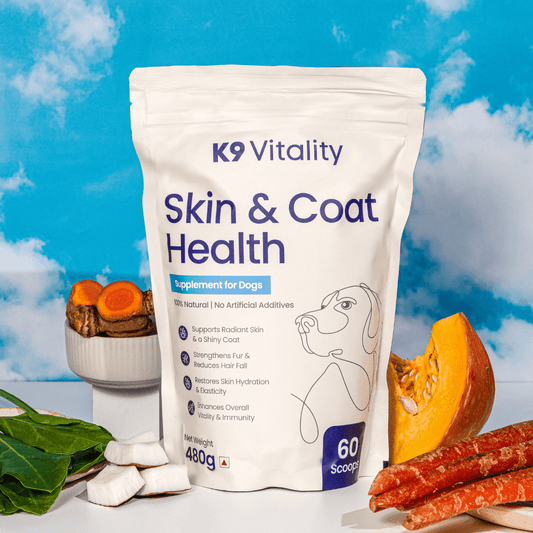
What Are the Essential Nutrients Dogs Need?
Share
Dogs thrive on a balanced diet rich in essential nutrients. For Indian pet owners, understanding nutrients for dogs is key to ensuring their furry companions live healthy, active lives. From protein to vitamins, each nutrient plays a vital role in their growth, immunity, and energy. Let’s explore the must-know essentials!
The Importance of Nutrients for Dogs
Proper nutrition is the foundation of your dog’s health. A diet of essential nutrients helps maintain strong muscles, a shiny coat, and a robust immune system. Neglecting nutrition can lead to issues like obesity, lethargy, and digestive problems, significantly impacting your dog’s quality of life.
Common Nutritional Mistakes Indian Pet Owners Make
- Feeding Human Food: Many Indian pet owners share leftovers with their dogs, unaware that some ingredients, like spices and chocolate, are harmful.
- Irregular Portions: Overfeeding or underfeeding can result in weight issues or malnourishment.
- Ignoring Specific Needs: Different breeds, ages, and health conditions require tailored diets. A one-size-fits-all approach rarely works.
Key Nutrients for Dog’s Health

A well-rounded diet ensures your dog gets all the essential nutrients to thrive. Here are the core nutrients every dog needs:
Proteins for Muscle and Tissue Development
Proteins are the building blocks of your dog’s body, aiding in muscle repair and growth. Rich protein sources include chicken, fish, eggs, and legumes. Higher protein intake is crucial for active breeds to support their energy demands.
Fats for Energy and a Healthy Coat
Fats, especially omega-3 and omega-6 fatty acids, are essential for maintaining energy levels, a shiny coat, and healthy skin. Sources like fish oil, flaxseed, and coconut oil can enrich your dog’s diet.
Carbohydrates for Energy
Carbohydrates provide the energy needed for daily activities. Ingredients like rice, oats, and sweet potatoes are excellent sources of easily digestible carbs, especially for Indian home-cooked meals.
Vitamins and Minerals for Immunity
Vitamins (A, D, E) and minerals like calcium and phosphorus support immunity, strong bones, and overall health. Leafy greens, carrots, and fortified supplements are great additions to ensure these micronutrients are included.
Water: The Overlooked Nutrient
Hydration is critical for your dog’s well-being. Water aids in digestion, regulates body temperature, and ensures proper nutrient absorption. Always ensure clean, fresh water is available for your pet.
With these nutrients, you can build a diet that keeps your dog active, healthy, and happy.
Customizing Nutrition Based on Dog Breed and Size

Dogs are not one-size-fits-all when it comes to nutrition. A large breed like a Labrador has different dietary needs than a small breed like a Pomeranian. Puppies require higher protein and calcium for growth, while senior dogs need easily digestible food to support aging joints and organs.
- Small Breeds: Require calorie-dense meals due to their high metabolism.
- Large Breeds: Need controlled portions to avoid overfeeding and joint stress.
Addressing Special Diets
Certain dogs have specific dietary requirements due to health conditions or allergies. Tailoring their food ensures they get the right nutrients without adverse effects.
- Allergies: Dogs with sensitivities to grains or proteins may benefit from hypoallergenic or grain-free diets.
- Medical Conditions: Dogs with diabetes, kidney issues, or obesity require specialized diets designed by a veterinarian.
- Active Dogs: High-energy breeds need extra proteins and fats to support their lifestyle.
By understanding your dog’s unique needs, you can create a diet plan that keeps them healthy, happy, and thriving.
Homemade vs. Commercial Dog Food
Deciding between homemade and commercial food is a common dilemma for Indian pet owners.
- Homemade Diets: Freshly cooked meals like rice, chicken, and vegetables can be highly nutritious but need careful balancing to include all essential nutrients.
- Commercial Food: Premium brands offer scientifically formulated options for specific breeds, sizes, and life stages, ensuring your dog gets a balanced diet.
Supplementing Indian Diets for Dogs
For Indian pet owners relying on homemade diets, supplements can fill nutritional gaps.
- Protein Sources: Paneer, boiled eggs, and curd are excellent additions but should be given in moderation.
- Essential Fats: Add coconut oil or fish oil for omega-3 and omega-6 fatty acids.
- Avoid Harmful Foods: Never feed your dog foods like chocolate, onions, garlic, or spicy dishes.
Consulting a Veterinarian
A vet can guide you in tailoring a diet plan suited to your dog’s breed, age, and health conditions. Regular checkups help monitor their weight and nutritional needs, ensuring long-term health and vitality.
Conclusion
A balanced diet is essential for your dog’s health and happiness. Understanding nutrients for dogs ensures they receive the right mix of proteins, fats, vitamins, and more. For Indian pet owners, investing time in proper nutrition and consulting a vet can lead to a thriving, energetic, and healthy furry companion.






